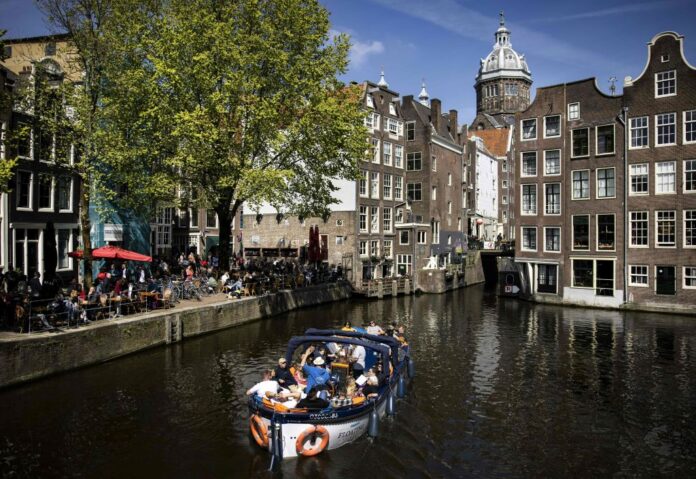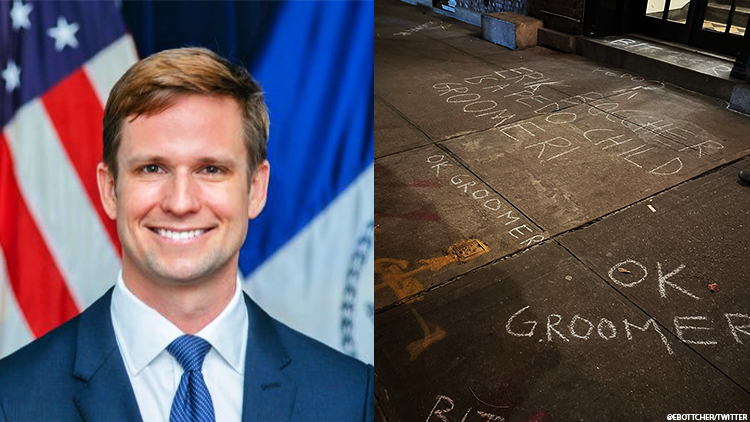
Last month, in preparation for an article about the growing gay backlash against trans ideology, I spoke with Bev Jackson, the co-founder of LGB Alliance, a gay and lesbian activist group that opposes the hijacking of the gay rights movement by transfolk. Bev told me about her background — fifty years in British gay activism, a resident of Amsterdam for four decades — and asked me about mine.
I mentioned my 2006 book While Europe Slept, a cri de coeur about the Islamization of Europe. I heard in her voice a degree of disquiet about its topic. Nonetheless, she asked me to participate in the LGB Alliance’s forthcoming annual convention. I accepted, but when I hung up I told my partner: “I’ve been invited to a convention in London. And when they look at my Wikipedia page they’ll disinvite me.”
Sure enough, a few days later, Bev emailed me, saying that her board had decided that I was the wrong age, sex, and race to meet their diversity requirements, and that my anti-Islam stance was problematic.
The identity group bean-counting was obnoxious enough. But my criticism of Islam? Think of it: a self-styled gay activist, who according to Islamic teaching should be executed, was worried about offending Muslims. This was, moreover, a woman who’d experienced Amsterdam during that brief golden era when it was gay heaven — an era when, among other things, it was one of the few places on earth where gays could walk down the streets hand-in-hand without worrying about being pummeled to bits.
An era, that is, before Islam moved in and gradually changed everything.
I first visited Amsterdam in 1997. I flew back several times over the next few months. Each time, I stayed in the downtown area — the centrum. I loved it. In 1998, I moved there. And it was then that I woke up to the city’s grim reality: surrounding that vibrant storybook centrum were grim suburbs where countless Muslims lived just as they had back in their homelands. The wives and daughters were property; the sons, in huge numbers, were thugs. I’d lived in New York City for more than forty years, but it wasn’t until I moved to Amsterdam that I was mugged — the perpetrator being a dinky teenage member of a Muslim gang who pulled a knife on me one evening in the very center of the centrum.
For many Westerners, 9/11 was a wakeup call about Islam. Amsterdam was my wakeup call. Six months after moving there, I left. But I kept following the Dutch news. I cheered the rise of Pim Fortuyn, the brilliant gay sociologist who warned that the rise of Islam in the Netherlands would lead to a diminishment of the freedom and security enjoyed by Dutch gays — and, indeed, to a loss of individual liberty in general. He was a few days out from an election that would probably have made him the nation’s prime minister when he was gunned down, on May 6, 2002, by an activist who deemed him guilty of being mean to Muslims.
There were other Dutch critics of Islam. On the morning of November 2, 2004, one of them, filmmaker Theo van Gogh, was butchered by a Muslim youth. A couple of days later, I took my Norwegian friend Hege to see the killer’s mosque — whereupon a mob of enraged bearded men poured out of it and surrounded us, grabbing Hege’s phone and, mistaking her Norwegian accent for German, called her a Nazi. (In fact, her father was a Norwegian resistance hero.) I summoned the cops, who told us to leave the neighborhood: we were upsetting the Muslims.
Since then, I’ve returned to Amsterdam dozens of times. It’s still a great city, but you have to be increasingly careful. Way back in 2005, after a Muslim gang in Amsterdam beat up gay American journalist Chris Crain on a busy street, the head of the country’s major gay rights group said that tolerance of gays in Amsterdam was “slipping away like sand through the fingers.” On April 30, 2008, while the whole city was partying in the streets to celebrate the Queen’s birthday, ten Muslim men pulled nineteen-year-old fashion model Mike du Pree off an open-air catwalk just off Rembrandt Square and beat him severely.
Things have gotten worse since then. Many gays, feeling unsafe, have moved to the provinces, and the gay scene has shriveled considerably. Yet then as now, most activists and politicians dissemble about the situation. Back in 2005, a Human Rights Watch spokesman spun the Crain beating as an act of retaliation against anti-Muslim bigotry. So did a team of researchers tasked by Amsterdam’s mayor with explaining the rise in gay bashings.
In his 2006 book Murder in Amsterdam, about Theo van Gogh’s assassination, the Dutch intellectual Ian Buruma smeared Fortuyn, van Gogh, and Islam critic Ayaan Hirsi Ali (who’d been driven from the country) as dangerous extremists because of their unwillingness to compromise with Islam — even to the point of accepting the treatment of women as chattel and the inculcation in the young of hatred for infidels, especially Jews and gays.
Since van Gogh’s death, the major exception to this pattern of political cowardice has been the courageous Geert Wilders, who started the Freedom Party in 2006. Ten years later, another Islam critic, Thierry Baudet, founded another party, the Forum for Democracy. Meanwhile, Muslim immigration continues, Muslim neighborhoods grow, and Muslim self-segregation persists. More and more gays who once called themselves leftists now back Wilders or Baudet. Still, neither man has come close to the reins of power. Given the level of support Fortuyn enjoyed two decades ago, when things were far less urgent, I don’t entirely get it.
Which brings us back to Bev. An activist since 1970, she’s lived in Amsterdam since about ten years after that and has seen a uniquely safe, free, and beautiful home for gay people turn into a city increasingly occupied and policed by an existential enemy. But while working as a gay activist in Britain, she’s preferred to keep quiet about the threat to gay people posed by Islam.
I know this not just because of her disapproval of my counter-jihadism. Looking at Bev’s Twitter feed, I see that in 2017 she attributed support for Wilders to “xenophobia and Islamophobia.” She reacted to a BBC debate about jihadist terror by stating that “95 percent of the victims of terrorism are Muslims” (that familiar line that’s somehow supposed to mitigate murder). And in 2019, she bragged about combating “anti-Muslim bias.” (Nowhere in her Twitter feed, however, could I find a single mention of grooming gangs.)
Then, in June of this year, after a deadly terrorist attack at a gay bar in Oslo, she posted this: “It’s shocking to see a murderous attack on gay people by an Islamist terrorist. We must be able to discuss the underlying issues. Homophobic extremism — whether religious or secular — must be addressed.”
“Underlying issues”? The “underlying issue” here is clear: Islam teaches the slaughter of homosexuals. When a Twitter user pointed this out and quoted the relevant Koranic verse, Bev blocked him.
In short, Bev may be a gay activist, but she’s obviously a proud progressive first, committed to the absurd leftist fiction that Muslims are a cruelly oppressed group and thus natural gay allies (even though she’s perfectly able to see through identical lies about gay-transgender unity). Imagine living in Amsterdam for decades, seeing it become increasingly Islamized — and hence increasingly perilous for gay people — and saying and doing nothing about it, and still having the nerve to call yourself a proud gay activist!
Full points to Bev for standing up to transgender ideology. It’s a real menace. But if we battle it hard enough, it’ll go away: it’s too irrational to last. And when it’s gone, we’ll still have a Western Europe that grows more Islamic by the day. And Bev Jackson will, I presume, stay silent on that topic — along with millions of others. Yes, it’s baffling that Western Europeans fail to vote for their own survival. But is this failure any wonder, when even a veteran gay activist won’t be honest about the biggest threat to gays in our time?








